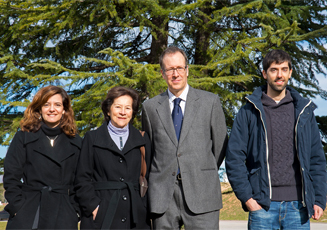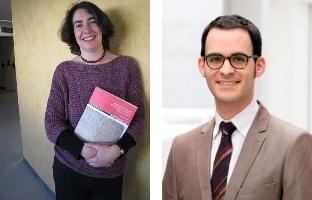Art and History

Research Group on Population Contact and Immigration Matters in Ancient Greece
Relations between groups or communities, especially economic, political and socio-legal relations, are a current topic but have a long history. The Research Group on Population Contact and Immigration Matters in Ancient Greece aims to study contacts and interactions between populations of different origins within the geographical, historical and cultural world of Greek antiquity (1st and 2nd millennia BC).
Relations between groups or communities, especially economic, political and socio-legal ones are a current topic, but have a long history. Research Group on Population Contact and Immigration Matters in Ancient Greece was created in 2006 within the Department of Antiquity and Middle Age Studies with the aim of collecting and analysing the written testimonies (literary and epigraphic sources) from the ancient Greek world (1st and 2nd millennia BC) which transmit information about contacts and interactions between populations of different origins within the geographical, historical and cultural world of Greek antiquity.
This group is led by Dr Rosa-Araceli Santiago Álvarez, Emeritus Professor of the same department. Other members of the UAB who are part of this group are Dr Miquel Gardeñes Santiago, Professor of the Department of Private International Law; Dr Marta Oller Guzmán, Lecturer of the Department of Antiquity and Middle Age Studies, and Adrià Piñol Villanueva, PhD Fellow in the same department, who is currently engaged in the writing of his PhD Dissertation under the guidance of Prof. Santiago. External members include Dr Anna Ginestí Rosell, Professor in the Katholische Universität Eichstätt-Ingolstadt(Germany), and Dr Chrístian Oró Martínez, Senior Research Fellow at the Max Planck Institute Luxembourg for International, European Regulatory and Procedural Law.
The group’s methodology is based on the rigorous analysis of texts in the original Greek. Among sources, we consider epigraphic ones as particularly important, sinceinscriptions offer testimonies that, though often limited and fragmentary, have the advantage of having come to us as they were written and are carriers of snapshots of a material reality. Therefore, they add direct evidence to information from literary sources, larger but also more elaborate, which additionally help to clarify many aspects of the historical analysis suggested by the literary texts.
For the interpretation of institutional aspects, especially those legal issues related to foreigner matters, we have the co-operation of Private International Law specialists. This co-operation is very valuable to all: the availability of direct information deducible from the documents themselves is of great interest for those interested in the history of legal aspects, and we philologists can broaden our analysis horizon and go beyond the scope of purely philological approaches. Even lawyers have been induced to reflect upon the historical and conceptual aspects of their own subjects.
The research of this group has been oriented in two directions, one of which is more focused on institutional aspects. It mainly aims at investigating two aspects: the institutional formalisation processes of the standards or rules that governed relations, both private and public, with the “foreigner”, and the different degrees of integration of the “alien”, whether non-Greek or Greek from another community, in a community different from his own. We are currently paying special attention to the commercial traffic and to possibilities and degrees of access to real estate and to justice by foreigners.
The second direction is focused on the mythical and literary analysis. In this case, the research deals primarily, though not exclusively, with the manifestations of the ancient Greek tradition of “hospitality”, xenía, already widely present in the Homeric era and with a long tradition thereafter.
Since the research group was established, our work has covered a very wide range of subjects, including aspects as varied as Greek/barbarian otherness, metropolis/colony relations in the framework of Greek colonisation, the wealth of the Homeric testimony, trade peculiarities, syncretism and geographical and temporal extension of Achilles’ cult, funerary epigraphy as a source of information, the indirect testimony of Greek theatre, as well as other technical aspects such as the examination of rules governing private and/or public relations with foreigners and their different degrees of integration into the community, or more general issues such as lexical analysis.
Selected publications
A recent summary of the variety of topics of our publications can be found in the bibliography section of the monograph: Santiago Álvarez, R.-A. (coord.); Oller Guzmán, M. (ed.) (2013). Contactode poblaciones y extranjería en el mundo griego antiguo. Estudio de fuentes. Faventia supplements 2.Bellaterra. Available at: <http://ddd.uab.es/record/113148?In=es>.
Other publications, either recent or older ones, which we consider of interest are:
1. Santiago, R. A. (1997). “Algunos ejemplos de Realpolitik en las fuentes griegas”, Faventia 19/2, 33-50.
2. Santiago, R.A. (2004). “La Ciropedia ¿Una parábola del ejercicio del poder?”. ΦΙΛΟΠΑΤΡΙΣ, Tomo en Honor de Alexis-Eudal Solà, M. Morfakidis (ed.), Centro de Estudios Bizantinos, Neogriegos y Chipriotas, Granada, 21-34.
3. Santiago, R.A. (2005). “Un ejemplo didáctico de epigrafía, dialectología e instituciones griegas”. Estudis Clàssics: Imposició, Apologia o Seducció?, Actes del XVè Simposi de la Secció Catalana de la Sociedad Española de Estudios Clásicos, Lleida, J. Danés, P. Gilabert, M. López, J. Lluis, E. Marcos, E. Romero, B. Usobiaga (eds.), Lleida, 495-509.
4. Oller Guzmán, M. (2014). «La carta de Dionisio: un nuevo testimonio del comercio griego norpóntico». ZPE192, 169-175.
5. Ginestí, A. (2014). «Τηλοῦ πατρίδος. Die Sprache der Grabinschriften von Ausländern in Athen. E. Olshausen / V. Sauer (Hg.), Mobilität in den Kulturen der antiken Mittelmeerwelt, Stuttgarter Kolloquium zur Historischen Geographie des Altertums II, 2011, Stuttgart, 241-260.
6. Piñol, A. (forthcoming). “Acceso a la propiedad de bienes raíces por parte de extranjeros en la épica griega arcaica”. Ianua Classicorum. Temas y formas del Mundo Clásico [Proceedings of the XIII Congreso de la Sociedad Española de Estudios Clásicos, Logroño, July 18-23, 2011], Madrid, vol. 1, 365-371.

Figure 1: Dr Anna GinestíRosell and Dr Crístian Oró Martínez.
Top left figure: Group and UAB members. From left to right: Dr Marta Oller Guzmán, Dr Rosa-Araceli Santiago Álvarez, Dr Miquel Gardeñes Santiago and Adrià Piñol Villanueva.
Rosa-Araceli Santiago Álvarez
Marta Oller
Department of Ancient and Medieval History
2026 Universitat Autònoma de Barcelona
B.11870-2012 ISSN: 2014-6388
